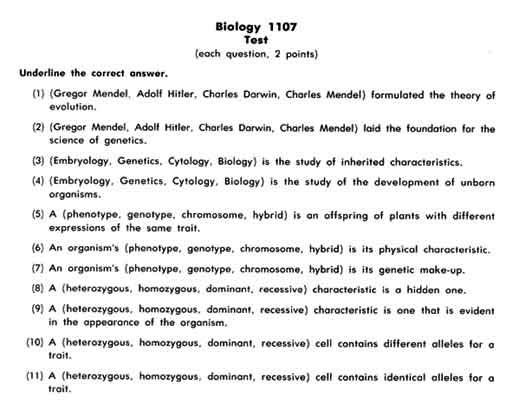
If you’ve heard of Accelerated Christian Education, it’s probably for the claim in one of their science books that the existence of the Loch Ness Monster disproves evolution. This arresting piece of information has gone viral on the web twice, guaranteeing that the organisation, which was founded in Tennessee in 1970, can never again be discussed without reference to it. I attended an ACE school from 1996 to 1999. Overcoming their indoctrination was a long and painful process; as recently as 2007 I wrote that evolution was “only a theory”. Later, it was my complaint to the Times Education Supplement that kickstarted the news of ACE’s Gospel of Nessie.
In reality, Nessie is the least of ACE’s problems. You could remove all creationist references, and what remained (which wouldn’t be much in the sciences) would still be deeply troubling. In Britain, this has not stopped ACE from receiving positive OFSTED reports, recognition from a government agency and, in some cases, limited government funding.
At least five ACE schools have received British taxpayers’ money since 2010, through the government’s nursery voucher programme. Under this scheme, private institutions can receive funding for educating children below the compulsory school age. According to its OFSTED report, Carmel Christian School, Bristol currently has 17 children receiving government money in this way. According to their most recent OFSTED reports, four other ACE schools to have received funding in this way are Excellence Christian School, Tower Hamlets, Redemption Academy, Stevenage, Kings Kids Christian School, New Cross, and The Lambs Christian School, Birmingham.
Carmel was the subject of the 2008 Dispatches documentary In God’s Name, which followed the activities of Christian fundamentalists in the UK. In one memorable scene, a teacher addresses a group of very small children:
Teacher: “Before Jesus came, people who sinned died. People who disobeyed God turned into a pillar of salt. So thank God for Jesus, because we can actually say, ‘Jesus, I’m sorry, I did something wrong then’, and we don’t have to fear turning into a pillar of salt, which really really happened in the Old Testament. Dominique?”
Little girl: “And we don’t also have to get sucked up into the earth like the Israelites.”
Teacher: “They did. There were some Israelites that got sucked up into the ground. And when the Israelites were in the desert, God thought, ‘Oh gosh, I’m looking after them and they’re moaning,’ so he sent snakes to bite them!”
Accelerated Christian Education integrates “Biblical character building” into all aspects of the curriculum. Every workbook teaches one of 60 “character traits of Jesus” – submissive, deferent, meek – and Bible lessons are woven into every subject.
Promotional materials claim that ACE’s preschool curricula “introduce social skills, the wonders of God’s world, and the wonders of God’s love”. It can be difficult to prove that a programme emphasising love and good behaviour is harmful. But this is a curriculum that also teaches the assured destruction and damnation of all who do not believe. It is hard to see how this promotes the “spiritual, moral, social, and cultural development” of pupils (OFSTED, incidentally, rated Carmel’s Early Years Foundation Stage as “outstanding” in this area).
Senior-level ACE materials are no less worrying. Politics workbooks teach that right-wing political views are the only acceptable ones. In religious studies, other religions are declared false with little attempt at cultural understanding:
Mohammed’s religion would be strongly monotheistic, anti-idolatrous, but false… Fanatical military advance, booty, polygamy: all made Islam attractive (to men only; women were and still are repressed).
ACE’s English literature courses do not include any secular books; these are corrupting. They instead consist of biographies of missionaries alongside anti-evolution books such as When Science Fails and After the Flood: The Early Post-Flood History of Europe Traced Back to Noah, which is not intended as fiction. Another English workbook examines Jonathan Edwards’s sermon “Sinners in the Hands of an Angry God”:
“The God that holds you over the pit of hell, much as one holds a spider or some loathsome insect over the fire, abhors you, and is dreadfully provoked; his wrath towards you burns like fire… you are ten thousand times so abominable in his eyes as the most hateful and venomous serpent is in ours.” (From the Basic New Testament History textbook, published in 1976 but still in use today.)
Parties interested in starting an ACE school sign a service agreement, stating, “Only approved School of Tomorrow [ACE’s alias] curriculum, equipment, materials, and procedures shall be used.” These procedures include the building of student “offices” – isolated desks where children spend the majority of their time. These carrels are separated from other desks by wooden partitions; children are forbidden to talk or otherwise communicate in the learning centre. There are no teachers per se. Students learn from “PACE” – Packets of Accelerated Christian Education – workbooks divided into five core subjects: Science, Social Studies (history, politics and geography), Math [sic], English (grammar) and Word Building (spelling). Students must memorise a Bible verse in order to complete each PACE.
Activities in the PACEs consist almost entirely of fill-in-the-blank and multiple-choice comprehension questions. Asking questions and thinking critically are excluded, while religious instruction is packed into the exercises. In English PACE 1105, for example, students are asked to identify the part of speech of the italicised word in the following sentences:
1) Why does God allow things like the death of a loved one to come into our lives?
2) Well, His purpose is to draw us to Himself.
3) He does not want us to say, “I am angry because this happened to me.”
4) Instead He wants us to say, “Thank you Lord.”
Having completed these exercises, students go to a score station where they mark their own work from answer keys. This makes Accelerated Christian Education hard to defend from even an academic point of view. Obviously, with a system like that, opportunities to cheat are rife. It means the student who learns by rote will, with half the effort, get the same scores as or better than a student who tries to learn in depth. The system rewards shortcuts.
At the end of each PACE, students take a test consisting of repeated questions from the PACE, in the same fill-in-the-blank or multiple-choice format. When children are tested in this way, there is no evidence that learning has taken place. The student may understand perfectly, or they may simply have memorised the sequence of words from its previous appearances. The PACE test is not a valid measurement.

Students in ACE schools don’t take GCSEs, A Levels or any other recognised qualification. Instead, they complete the International Certificate of Christian Education (ICCE). The various levels of ICCE qualification (from Vocational to Advanced) are all based on completing PACE tests. Students also have to complete a handful of additional assignments, including writing a science essay. Students can choose their assignment from several options, one of which is:
1) Write an apologetics essay to support creation.
The pupil would be required to research the topic well, not only providing a case for refuting the theory of evolution but also building a solid case for creation.
One might think that a qualification like this would be met with derision by providers of higher education, but ICCE’s providers say this is not so. Their website claims ICCE graduates have been accepted to study at such reputable universities as Imperial, Cardiff, Birkbeck, Glasgow, Manchester and Surrey. Other ACE websites claim graduates have been accepted at Oxford and Cambridge.
All of which might make my critics argue that the ICCE can’t be that bad. That’s not logically true. I don’t argue that it’s impossible for students to learn from the ACE system, only that their method of assessment rewards cheating and is not a valid measure of learning. It’s also notable that none of these ICCE students have gone on to study biology.
I don’t think that universities should refuse ICCE applicants on principle. My view is that if a student makes it out of ACE alive, they have already suffered enough. These applicants should be judged on their own merits. The ICCE itself, however, should not be taken as any kind of evidence of ability.
Incredibly, the National Academic Recognition Information Centre (UK NARIC, funded by the Department for Business, Innovation and Skills) has twice issued press releases announcing that it considers the ICCE to be comparable to Cambridge International A-level Standard. Besides being patently absurd, this recognition has had the damaging effect of making ACE schools seem more credible. ACE schools mention NARIC’s recognition in their promotional materials as a way of assuring parents that the qualification they offer is academically sound. NARIC, being privately run by ECCTIS Ltd, is not subject to Freedom of Information, and they have refused to release their ICCE report, or to comment further on it.
In okaying the curriculum in ACE schools, inspectors are failing to hold these schools accountable. Perhaps this is unsurprising. One man who has inspected ACE schools on at least four occasions is Stephen Dennett. He is the author of a book, The Case for Christian Education, extolling the virtues of ACE, and he is now adviser to the board of the ICCE.
OFSTED reports are simply not rigorous enough. It seems unlikely that schools requiring students to spend the majority of their time working alone in silence are fostering social skills. It’s less likely that schools which label all outsiders as sinners and then uncritically study a work claiming that God abhors sinners promote cultural and moral awareness. And it’s impossible that a science curriculum is satisfactory if it insists humans and dinosaurs co-existed within the last 10,000 years.
All ACE schools are private, and there is a feeling in some quarters that this puts them beyond criticism. The parents’ right to choose their child’s education is seen as a sacred democratic value. I contend that the interests of the child trump the parents’ right to choose, and in this situation, more stringent regulation is required to prevent harm to the children. The courts, it seems, might agree with me. In 2004 the Christian Schools Trust’s legal battle to spank children (a “Biblical right”, they maintained) reached the House of Lords. In their judgement, the Lords agreed that the parents’ right to practise their religion had indeed been infringed, but that this infringement was justified. In this instance, the child’s right not to be harmed trumped the parents’ right. This is a principle we would be wise to apply more widely when considering extremist faith schools.
It’s clear that there are three areas where we can make an effective start on the better regulation of private faith schools. Firstly, we must stop the government funding of places for EYFS children in these schools. Secondly, NARIC must remove its endorsement of the ICCE (or the government must give the NARIC contract to a different company if ECCTIS, the current provider, won’t play ball). And thirdly, we must insist on more thorough inspections of faith schools by disinterested parties.
If we take these steps, children of fundamentalist parents may get half a chance to think for themselves.

